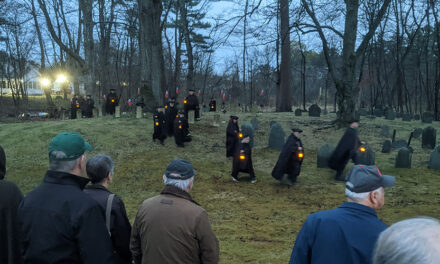Published January 23, 2019
By DAN TOMASELLO
LYNNFIELD — Less than 24 hours after a group of residents submitted four citizens’ petitions for a special district meeting, the Lynnfield Center Water District (LCWD) Board of Water Commissioners nixed two articles from moving forward.
In a memo sent to Water Commissioners Chairwoman Connie Leccese and Water Commissioner Richard Lamusta on Jan. 15, LCWD attorney Chris Casey argued Articles 3 and 4 should be prohibited from being included on the warrant for the Feb. 25 special district meeting because he claimed they violate the district’s enabling act.
Article 3 sought to ask ratepayers to approve increasing the LCWD’s existing filter rebate program for ratepayers who have discolored water from $200 to $2,000, and authorized the district to spend up to $80,000.
“The proposed article conflicts with the enabling act and therefore should not be accepted for inclusion on the warrant,” Casey stated in the memo. “The proposed article in effect seeks to indirectly usurp the authority of the board to determine the water rates by grossly expanding the amount of the existing filter rebate program.”
During the December special district meeting, Merrow Road resident Ken MacNulty made an unsuccessful motion to amend a citizens’ petition that would have allocated more funds to the rebate program. Casey and the water commissioners never said the amendment was against the enabling act last month.
Casey also nixed Article 4, which sought to have the LCWD “cease and desist the charging of all new water rates passed in 2018 and implemented for water used in 2017 and 2018.” Article 4 would have mandated that the LCWD “reissue bills to all customers based on the prior rate structure and provide a rebate for all bills already paid.”
Article 4 also sought to prevent the water commissioners from raising rates in the future until an independent firm completed a study on water rates.
“The proposed article seeks to usurp the authority of the board to determine the water rates,” said Casey.
Casey cited Section 10 of the enabling act as the reason why the two warrant articles cannot move forward. Section 10 states that the “Board of Water Commissioners shall fix just and equitable prices and rates for the use of water, and shall prescribe the time and manner of payment.”
“The income of the water works shall be appropriated to defray all operating expenses, interest charges and payments on the principal as they shall accrue upon any bonds or notes issued under authority of this act,” Section 10 continues. “If there should be a net surplus remaining after providing for the aforesaid charges, it may be appropriated for such new construction as said water commissioners may recommend, and in case a surplus should remain after payment for such new construction the water rates shall be reduced proportionately. Said water commissioners shall annually, and as often as the district may require, render a report upon the condition of the works under their charge, and an account of their doings, including an account of receipts and expenditures.”
In closing, Casey states, “It is clear that the water rates are properly voted on by the commissioners at a duly-noticed public meeting.”
“The ratepayers cannot usurp this function through a warrant article,” said Casey. “For this reason, I recommend that the proposed Article 4 not be accepted for inclusion in the warrant.”
The LCWD board was given an earful about the rate increase during last week’s meeting. After the discussion, the water commissioners voted to extend the payment date for ratepayers’ water bills by 60 days.
The water commissioners’ decision to nix Articles 3 and 4 is not the first time they have hit the brakes on a proposed warrant article. Wymon Way resident Rob Almy submitted an article for the special district meeting last December that would have formed an independent search committee tasked with finding retired LCWD Superintendent Ken Burnham’s successor. Casey maintained that proposed article also violated the LCWD’s enabling act.
Selectmen Chairman Dick Dalton, who crafted the four warrant articles for the Feb. 25 special district meeting, said he was disappointed the water commissioners decided not to include Articles 3 and 4.
“I can’t judge the attorney’s legal opinion, but it does show that the commissioners have a complete disregard for the ratepayers,” Dalton said in an interview with the Villager. “The town administrator and town counsel will be meeting with me, and we will be exploring all legal avenues because the town is in fact the largest ratepayer and therefore has standing.”
The selectmen were tentatively scheduled to discuss potential litigation against the LCWD during executive session on Tuesday. The meeting took place after the Villager went to press.
Two articles OK’d
Casey stated in the memo that Articles 1 and 2 can be included on the warrant.
Article 1 seeks to have ratepayers vote for a new water commissioner to succeed Burnham, who resigned as a commissioner earlier this month. Article 2 will ask voters to “direct the Lynnfield Center Water District Board of Water Commissioners to begin the process for recruiting a new superintendent for the position currently vacant no sooner than the 2019 annual meeting.”
“To maintain adequate operational capacity, the Board of Commissioners may exercise its discretion in filling the superintendent’s position on a temporary basis until such time as the superintendent’s position is filled on a permanent basis through the recruitment process,” reads Article 2.
The water commissioners will be closing the warrant for the special district meeting on Monday, Feb. 11. The next LCWD board meeting is Monday, Jan. 28, beginning at 6:30 p.m. in the Lynnfield Middle School cafeteria.




